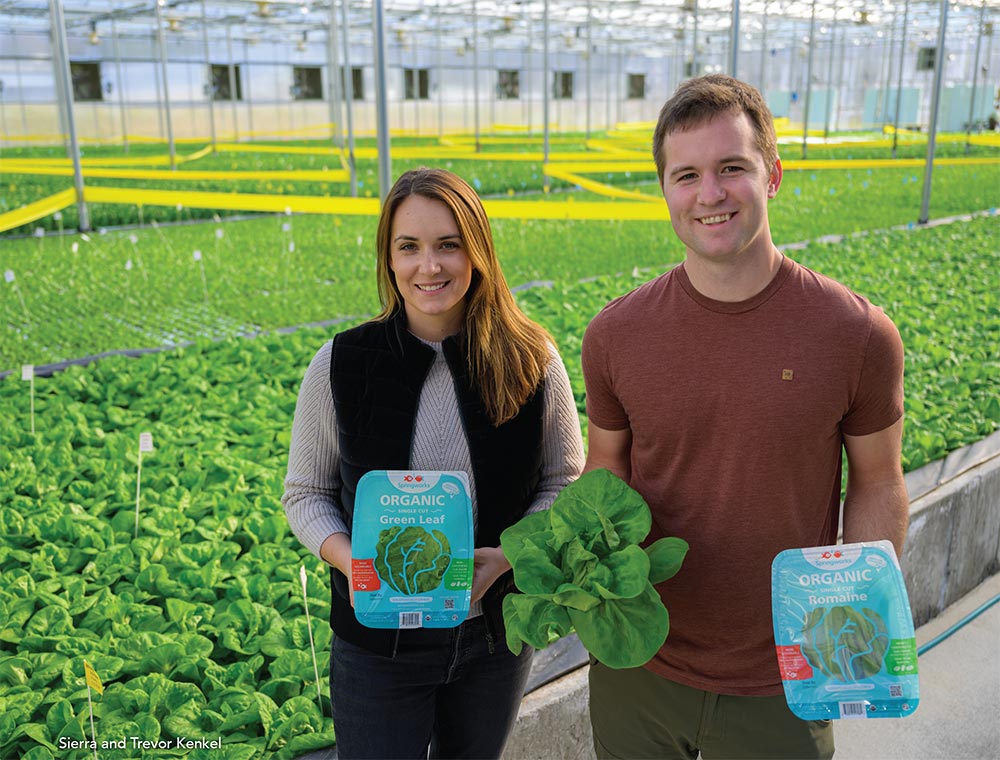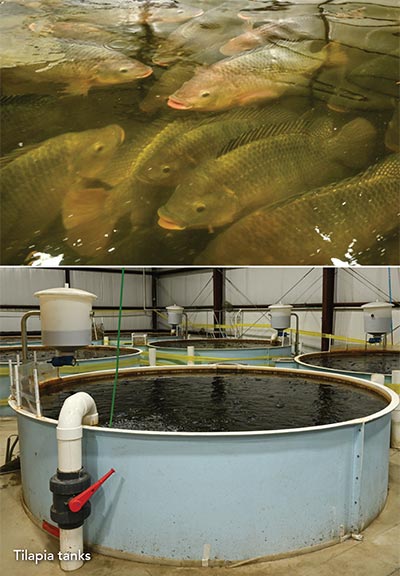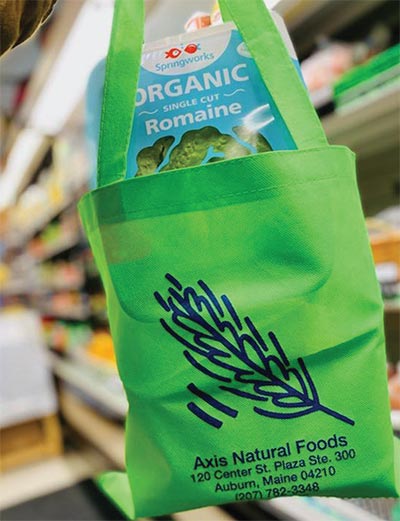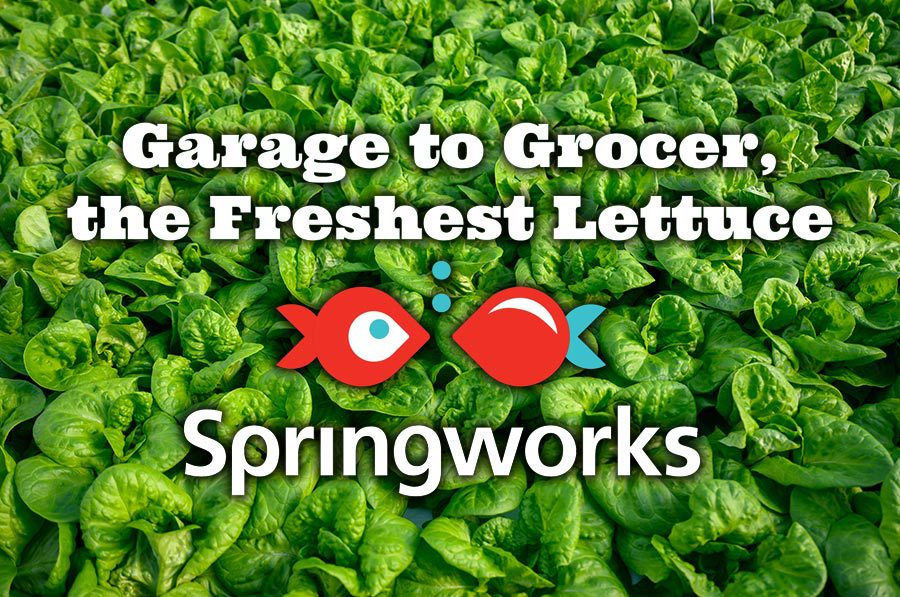Written by Jillian Netherland | Photography by David Fuller
It may be hard to imagine that the largest aquaponics greenhouse in the Northeast, producing just slightly less than two million heads of lettuce each year, began with a horse trough and some PVC piping in a garage in Montana; however, that’s exactly how Springworks was born.

Big Sky Goals
“Trevor always had an entrepreneurial spirit,” says Sierra Kenkel, Vice President of Springworks and sister of Springworks President, Trevor Kenkel. “Our parents held a Christmas party each year, and he would sell baked goods to raise money or simply ask guests for donations in support of different environmental organizations.”
This natural, deep care for the environment led Trevor to his mission of finding a better way to grow produce. While fishing at a local creek, Trevor noticed the water was discolored, and the fish had become less prevalent. Upon further investigation, he learned these changes resulted from chemical runoff from a canola farm, eventually killing the creek’s frogs and fish and ultimately inspiring Trevor to research and experiment with alternative approaches to growing and farming produce.
“Keeping our produce organic to prevent damaging the nutritional value of the plants was important from the start; however, Montana weather is harsh, with only a few months out of the year to grow with soil,” explains Sierra. Undeterred, Trevor took matters to the family garage, building their first horse trough and PVC piping aquaponics system. “It was a lot of trial and error to get to that point, but eventually, it worked so well that we had heads of lettuce, tomatoes, herbs, peppers, and even a lemon tree growing in the garage.”
Out of the garage, into the greenhouse
Trevor was a 19-year-old freshman at Bowdoin College when Springworks was officially founded. When an injury led Trevor to take a gap year from school, he put his energy into bringing the original idea of Springworks to life – pitching to investors, finding land, and working out logistics, including easy trucking access, and a regional approach to localizing lettuce with a focus on serving broader New England.
“Growing organic, local lettuce for our region means we offset lettuce that would have been shipped thousands of miles across the country,” shares Trevor. “This reduces emissions and food waste and means fresher greens for our customers.”
Not your average fish bowl
 How exactly does Springworks produce lettuce year-round without the use of soil? The surprising but simple answer is fish, specifically tilapia. These fish become the driver of nutrients by making fertilizer for the lettuce, which then recirculates the water back to the fish with the support of a UV filter and mechanical and bio-filtration systems. This method of production, known as aquaponics, requires all parameters to be in check through a detailed control system managing humidity and temperature, proving invaluable when resulting in a consistent product, regardless of weather, time of year, and other variables that cannot be controlled.
How exactly does Springworks produce lettuce year-round without the use of soil? The surprising but simple answer is fish, specifically tilapia. These fish become the driver of nutrients by making fertilizer for the lettuce, which then recirculates the water back to the fish with the support of a UV filter and mechanical and bio-filtration systems. This method of production, known as aquaponics, requires all parameters to be in check through a detailed control system managing humidity and temperature, proving invaluable when resulting in a consistent product, regardless of weather, time of year, and other variables that cannot be controlled.
“We grow lettuce using an ecosystem approach, where organisms work together to create the best growing conditions for organic lettuce,” Trevor explains. Not only is this method efficient, it’s also conservation-friendly, resulting in a 95% decrease in water and a 20-times increase in productivity from conventional farming.
“Agriculture accounts for 70% of the world’s freshwater consumption and the largest use of land,” shares Emily Donaldson, Director of Business Development at Springworks, adding, “Creating such a productive system by utilizing so much less creates huge potential to change the status quo.”
Like all decisions made by the Springworks team, choosing tilapia was intentional. In addition to the large volume of research conducted to understand the fish, tilapia is a staple in many households, with local options for consumers mindful of traceability and supporting local foods.
“We are currently working on retail-specific options for tilapia,” shares Sierra. “We are looking into selling them as fillets in local seafood cases, and we should see this on the market very soon.”
At a grocer near you
 Although tilapia fillets won’t be for sale in local retailers until early 2023, Springworks lettuce can be found at several local establishments throughout the LA area, including Blackie’s Farm Fresh Produce, Axis Natural Foods, and the Lewiston and Auburn Hannaford locations.
Although tilapia fillets won’t be for sale in local retailers until early 2023, Springworks lettuce can be found at several local establishments throughout the LA area, including Blackie’s Farm Fresh Produce, Axis Natural Foods, and the Lewiston and Auburn Hannaford locations.
“We have been able to step in as a consistent grower of a consistent product for retailers,” states Sierra. “For example, we can replace conventional greens like romaine that are subject to massive recalls because we grow in a clean and sustainable way.”
What began as a teenager’s experiment in a garage halfway across the country is now a 66,000 square-foot farm spanning three facilities, with plans to grow by half a million square feet over the next six years.
The sky is still the limit
“As we look to add our fourth and largest greenhouse next summer, we are excited to bring about 40 new jobs to Maine and our community,” says Trevor. This addition of a fourth greenhouse will significantly impact Springworks’ output, allowing them to produce 5 million heads of lettuce and 315,000 pounds of tilapia each year – all from Lisbon, Maine.
“We are so lucky to be in the community we are,” adds Emily. “Maine is known for local craft foods and produce, and we can really help bring quality food identity to leafy greens in Maine.”
Springworks
347 Lisbon Street, Lisbon • springworksfarm.webflow.io
A Pennsylvania native, Jillian moved to Maine from Dallas, Texas, with her husband and two toddler daughters in August of 2020.
Her lifelong love of the written word began with writing short stories and poems at the age of six, eventually leading to the creation of her own company, EleGrant Writing Services. Jillian is a business development specialist for Androscoggin Home Healthcare + Hospice by day and enjoys live music, books, and creative writing.

